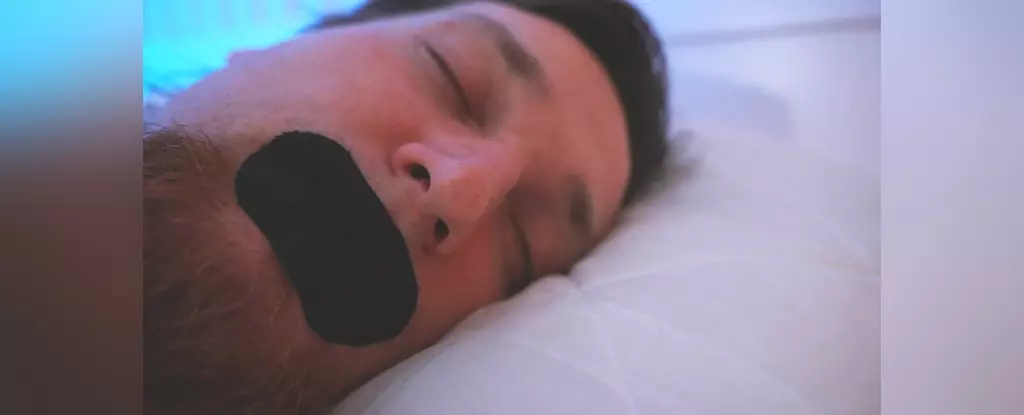In recent years, social media platforms like TikTok have birthed a range of viral wellness trends, with mouth taping taking the spotlight for its promise of improved sleep and overall health. Advocates claim that this simple technique—using a special porous medical tape to seal the mouth during sleep—can address issues from snoring to obstructive sleep apnea, while also enhancing jawline definition and boosting energy levels. However, amidst the sea of influencer testimonials and catchy hashtags, one must tread carefully through the murky waters of anecdotal evidence.
Mouth taping might appear to be an alluring shortcut to tranquility for sleep-deprived individuals and their frustrated partners. Yet, the science behind this trend is shockingly thin. It raises several critical questions about the validity and safety of such practices in addressing sleep-related issues. Are we really ready to embrace a solution without understanding its potential consequences?
Anecdotes Vs. Data: The Evidence Gap
A closer examination of the available literature reveals a significant disparity between the anecdotal experiences shared on social media and the scientific evidence—or lack thereof—surrounding mouth taping. Research that does exist tends to focus specifically on patients with mild obstructive sleep apnea or certain forms of mouth breathing, often conducted in controlled settings like sleep labs.
Some studies do indicate mild improvements for a small subset of subjects; however, broader conclusions are hard to come by. Many researchers express concerns over the quality of existing studies, which often suffer from limited participant follow-up, unrepresentative sample sizes, and failure to account for confounding variables that could skew results. This begs the question: how reliable is the data supporting mouth taping as a universal remedy?
Moreover, the improvements noted in mild cases often come with caveats—potential dangers for individuals with nasal obstructions. These risks can range from discomfort to more severe outcomes such as asphyxiation. The potential for harm emphasizes the need for a more nuanced understanding of the conditions prompting mouth breathing before resorting to what some might term a blatant “band-aid” solution.
The Underlying Causes: Breathing Problems Demand Attention
What the hype around mouth taping obfuscates is the importance of diagnosing and treating underlying health conditions that cause mouth breathing in the first place. Issues like nasal polyps, deviated septums, or chronic sinus infections can all lead to habitual mouth breathing, and instead of addressing these root problems, mouth taping may simply mask them.
To illustrate, if you’re wrestling with persistent nasal blockage, taping your mouth shut is unlikely to provide any relief. Instead, it may exacerbate the situation by creating a false sense of security and delaying necessary medical intervention. This illustrates a critical flaw in seeking quick fixes over more responsible, informed options to address health concerns.
The Call for Professional Guidance
The overwhelming consensus among health professionals is clear: if you’re grappling with sleep disturbances, the first step should ideally involve consulting a healthcare provider. This recommendation stands in stark contrast to scrolling through endless social media clips that tout one-size-fits-all solutions.
Addressing sleep issues is often complex and can involve various treatment methodologies including, but not limited to, lifestyle adjustments, oral appliances, or even surgical interventions in more severe cases. By seeking professional advice, individuals not only ensure that they are equipped with accurate information but also prioritize their long-term health over fleeting trends.
Redefining the Narrative: Social Media and Health Trends
Ultimately, the mouth taping phenomenon exposes a troubling truth about health trends proliferating in the age of social media: often, they lack the backing of rigorous scientific research necessary for validation. As consumers of information, we have a responsibility to critically analyze the advice offered—especially in light of its potentially serious implications.
Mouth taping may be harmless for some, but for others, it can be hazardous, illustrating why a headline-grabbing trend cannot replace thorough medical understanding. As we navigate this digital age of quick fixes, it’s paramount to ground health decisions in credible information and consult professionals to ensure optimal well-being.

